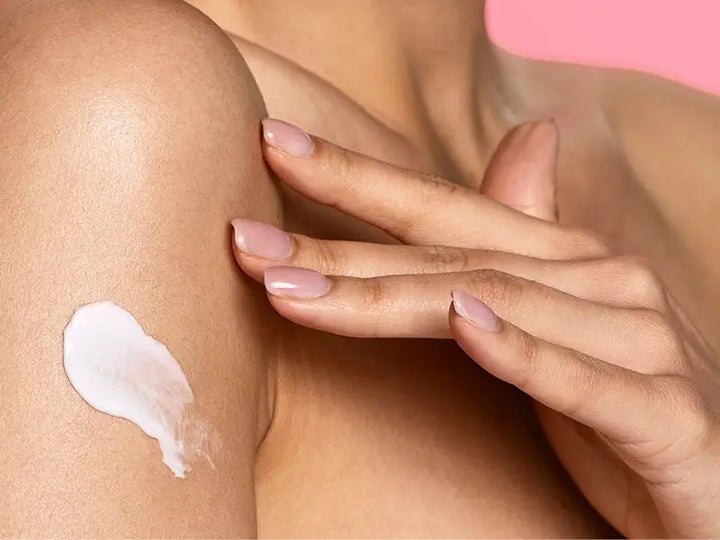Body oils have become a staple in skincare routines, offering nourishment and hydration to the skin. The terms "wet" and "dry" are often used to describe different types of oils based on their texture and absorption rate on the skin.
Wet oils are typically heavier and have a higher viscosity, which means they tend to leave a more noticeable oily residue on the skin. That being said, they are still highly beneficial for certain skin types and concerns, such as dry, flaky skin or eczema. They provide intense hydration and can help improve the skin's barrier function.
Dry body oil, on the other hand, has a lighter consistency and are more easily absorbed by the skin, leaving little to no residue. They are great for those who want a moisturizing boost without the heavy, oily feeling, and they are often used in facial and hair and skin care products.
The reason we often see "dry body oils" marketed instead of "wet body oils" is that many people prefer the lightweight texture and fast absorption, especially in hot and humid weather.
Understanding the differences between body oils, as well as their benefits, can help you choose the ideal product for your skin type and preferences. This article will delve into the world of body oils, comparing both types, and discussing their various applications and advantages for skin, hair, nails, and cuticles.
Defining Wet and Dry Oils: Key Characteristics
They both offer unique benefits and properties that cater to various skin types and preferences. Here is a closer look at the defining characteristics of these two categories of body oils:
A. Wet Oils
Consistency: Typically have a thicker consistency compared to dry oil, which contributes to the moisturizing effect they provide.
Absorption: Tend to absorb more slowly into the skin, often leaving an oily residue on the surface. This property can help to lock in moisture and provide long-lasting hydration.
Ideal for: Best suited for those with dry or very dry skin, as they provide intense moisturization and can help alleviate dryness, flakiness, and chapped skin.
Examples: Coconut oil, avocado oil, jojoba oil, sunflower oil, sweet almond oil, castor oil, and sesame oil.
B. Skin Dry Oils
Consistency: Lightweight, non-greasy texture, which allows them to absorb quickly and efficiently into the skin.
Absorption: Due to their fast-absorbing nature do not leave an oily residue on the skin surface, making them ideal for those who prefer a more matte finish or have oily or acne-prone skin.
Ideal for: Suitable for all skin types, including oily and acne-prone skin, as they provide hydration without contributing to excess oil or clogged pores. They can also be a great choice for those who dislike the heavy or sticky feeling .
Examples: Argan oil, rosehip oil, baobab oil, and grapeseed oil.
Experimenting with various oils and observing how your skin reacts will allow you to customize your skincare routine for optimal results.
Comparing Wet and Dry Oils: Effects on Skin Health and Appearance
A. Hydration and Absorption
Wet oils, such as coconut, avocado, and jojoba oil, provide intense hydration, making them ideal for individuals with dry or chapped skin. However, due to their thicker consistency, they often leave an oily residue and may take longer to absorb into the skin. On the other hand, oils like argan, rosehip, and baobab oil, absorb quickly without leaving a greasy feeling, making them suitable for all skin, including oily and acne-prone skin.
B. Nutrient Content and Skin Benefits
Both the common wet oils and dry oils are rich in essential fatty acids, vitamins, and antioxidants that nourish and protect the skin. Oils, such as sunflower oil and sweet almond oil, contain high levels of polyunsaturated fatty acids like linoleic acid, which help to soothe and moisturize the skin. In contrast, dry oils like rosehip oil are known for their ability to promote collagen production, fight premature ageing, and protect against sun damage.
C. Versatility and Usage
Wet and dry oils can both be used in various ways to enhance skin health and appearance. A few drops of either type of oil can be applied to damp skin after a warm bath or shower, or even on dry skin. Wet oils can be mixed with a cream moisturizer for added hydration, while dry oils can be used as a lightweight facial oil for those who dislike the heaviness of regular oils. Both oils can also be used on nails and cuticles to prevent dryness and promote healthy growth, as well as on damp hair to add shine and reduce frizz.
Experimenting with different oils, such as argan oil, rosehip oil, and coconut oil, can help you find the perfect balance for your skin, while also providing added benefits for your hair, nails, and cuticles.
Incorporating Wet and Dry Oils into Your Skincare Routine
A. Identifying Your Skin Type and Needs
To choose the most suitable oil for your skincare routine, start by identifying your skin type and specific needs. Dry and dehydrated skin may benefit from the intense moisturization provided by wet oils, while oily or acne-prone skin may prefer the lightweight, non-greasy texture of dry ones.
B. Optimal Application Techniques
For maximum benefits, apply skin oils to damp skin after a warm bath or shower, as this helps to ensures better absorption. A few drops of oil can also be used on damp hair to combat frizz and add shine. When using wet face oils, it is essential to allow ample time for the oil to absorb before dressing or coming into contact with fabrics. In contrast, dry oils can be applied directly to clean, dry skin without worrying about a sticky or greasy residue.
C. Targeted Treatments
Both oils can be used for targeted treatments, such as addressing dry cuticles or promoting healthy nail growth. Apply a small amount of oil directly to the nails and cuticles, massaging gently to help the oil penetrate and provide nourishment. Overnight treatments with wet oils can also provide additional hydration for extremely dry skin or hair.
D. Layering with Other Skincare Products
Both oils can be layered with other skincare products for a customized routine. Mixing a few drops of wet oil, like sweet almond oil, with your favourite cream moisturizer can boost hydration, while incorporating a dry oil, like argan oil, into your daily skincare regimen can provide antioxidant protection and promote a healthy complexion.
E. Experimenting and Adjusting
As with any skincare product, it is essential to test new oils on a small patch to check for potential allergic reactions. Don't be afraid to experiment with different oils and adjust your routine as needed to find the perfect balance for your complexion, hair, and nails.
Wet and Dry Oils for Hair Care and Nail Health
A. Hair Care
Both oils can be used to improve the health and appearance of your hair, providing essential nutrients, hydration, and hair shine too. Here's how to incorporate these oils into your hair care routine:
Wet oils: For dry or frizzy hair, oils like coconut or avocado oil can be applied to damp hair as a leave-in conditioner, or used as an overnight treatment for deep nourishment. These oils help lock in moisture and combat dryness.
Dry oils: For a lightweight, non-greasy solution, oils like argan or baobab oil can be applied sparingly to damp or dry hair, focusing on the ends to help reduce frizz and add shine.
B. Nail Health: Nourishing Nails and Cuticles with Oils
Both oils offer numerous benefits for nail health and cuticle care, promoting growth and preventing dryness:
Wet oils: Jojoba oil, known for its moisturizing properties and similarity to the skin's natural oils, is an excellent choice for nourishing nails and cuticles. Apply a small amount to nails and cuticles daily, massaging gently to promote absorption.
Dry oils: Argan oil, rich in vitamin E and essential fatty acids, can help prevent nail dryness and keep cuticles soft and healthy. Apply a few drops directly to nails and cuticles, allowing the lightweight oil to soak in without leaving a greasy residue.
By understanding the unique properties and benefits of wet and dry oils, you can effectively incorporate them into your hair and nail care routines, ensuring healthy, hydrated hair and nails that look and feel their best.
Choosing the Right Oil for Your Beauty Concerns
A. Dry Skin and Dehydration
Oils like coconut, avocado, and sweet almond oil can provide the deep moisturization needed to soothe and nourish. These oils, rich in fatty acids and vitamins, help to repair the skin's natural barrier.
B. Oily and Acne-Prone Skin
For individuals with oily or acne-prone skin, dry oils like rosehip, argan, and baobab oil are more suitable. Their lightweight, non-greasy texture ensures that they absorb quickly without clogging pores or causing breakouts. These oils can also help regulate sebum production and soothe inflammation.
C. Ageing and Sun-Damaged Skin
If you're looking to address signs of ageing or sun damage, dry oils like rosehip and argan oil can be an excellent choice. Rich in antioxidants and known for promoting collagen production, these oils can help reduce fine lines, wrinkles, and hyperpigmentation while improving skin elasticity and texture.
D. Sensitive and Reactive Skin
It's essential to choose gentle, hypoallergenic oils. Jojoba oil, which closely resembles the skin's natural sebum, is a popular choice for sensitive skin, as it helps to soothe and moisturize without causing irritation. Sunflower oil, rich in linoleic acid, can also help strengthen the skin's barrier and reduce inflammation.
E. Combination Skin
You may need to use different oils for different areas of your face and body. For example, you could use a lightweight dry oil like grapeseed oil on oilier areas such as the T-zone, and a more nourishing wet oil like sweet almond oil on drier areas like the cheeks.
Embracing the Benefits of Wet and Dry Oils for Holistic Skincare
Incorporating wet and dry oils into your skincare, hair care, and nail care routines can provide numerous benefits for your overall appearance and well-being. Understanding the unique properties and advantages of each type of oil is key to making informed choices that cater to your specific needs and preferences.
By exploring the world of body oils, you can unlock all the goodness and potential of these versatile, nutrient-rich products to address various concerns, enhance your hair's health and shine, and nourish your nails and cuticles. Embrace the power of wet and dry oils to transform your daily self-care rituals and enjoy the lasting benefits they offer for your skin, hair, and nails.



















